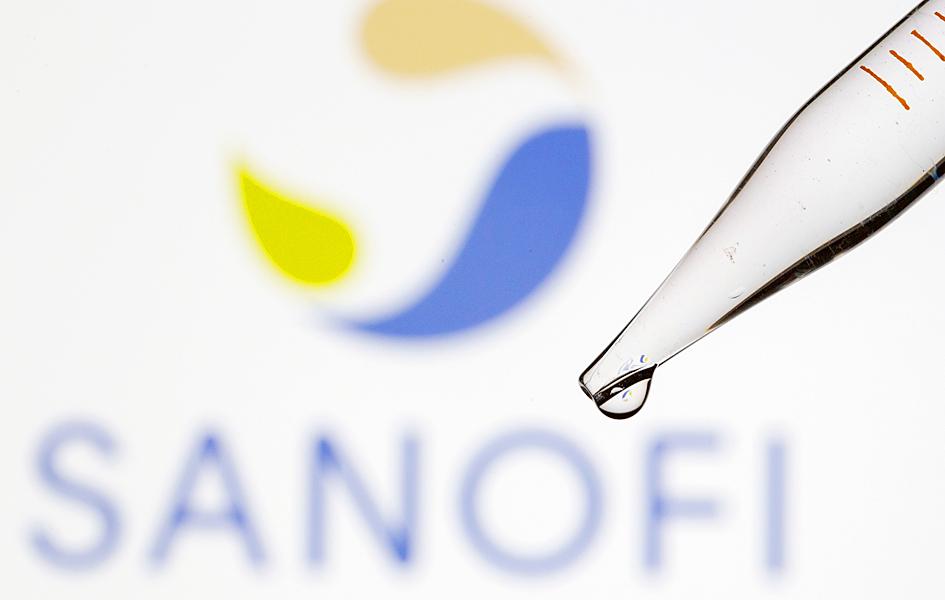Sanofi does not plan to pursue the development of a messenger RNA (mRNA) vaccine against COVID-19 because the shot will come too late to market.
The French pharmaceutical giant, which has lagged rivals in deploying the technology behind some of the world’s top-selling COVID-19 shots, made the decision despite positive results at phase 1 and 2 trials.
Carrying on with the development “wouldn’t address an immediate public health need, because the product would arrive too late on the market,” a spokesperson said. “Sanofi is focusing therefore on a recombinant protein candidate to address the needs of a booster vaccine.”

Photo: Reuters
The French drugmaker is developing that shot with Britain’s GlaxoSmithKline PLC, using a technology that is already part of the company’s seasonal flu shots.
The booster product, which faced months of delays, is now in a late-stage trial and could gain clearance by the end of the year.
Ordinarily a giant in the vaccines space, Sanofi has lagged behind BioNTech SE and Moderna Inc in the pandemic as they raced ahead with mRNA shots that have now been injected into arms more than 1 billion times and generated billions in revenue.
Last month, Sanofi bought its mRNA development partner Translate Bio Inc for US$3.2 billion with the aim of moving beyond vaccines and harnessing mRNA for treatments — something that BioNTech is investigating for cancer.
“Our goal is to unlock the potential of mRNA in other strategic areas such as immunology, oncology and rare diseases in addition to vaccines,” Sanofi chief executive officer Paul Hudson said at the time of the deal.

China’s Huawei Technologies Co (華為) plans to start mass-producing its most advanced artificial intelligence (AI) chip in the first quarter of next year, even as it struggles to make enough chips due to US restrictions, two people familiar with the matter said. The telecoms conglomerate has sent samples of the Ascend 910C — its newest chip, meant to rival those made by US chipmaker Nvidia Corp — to some technology firms and started taking orders, the sources told Reuters. The 910C is being made by top Chinese contract chipmaker Semiconductor Manufacturing International Corp (SMIC, 中芯) on its N+2 process, but a lack

NVIDIA PLATFORM: Hon Hai’s Mexican facility is to begin production early next year and a Taiwan site is to enter production next month, Nvidia wrote on its blog Hon Hai Precision Industry Co (鴻海精密), the world’s biggest electronics manufacturer, yesterday said it is expanding production capacity of artificial intelligence (AI) servers based on Nvidia Corp’s Blackwell chips in Taiwan, the US and Mexico to cope with rising demand. Hon Hai’s new AI-enabled factories are to use Nvidia’s Omnivores platform to create 3D digital twins to plan and simulate automated production lines at a factory in Hsinchu, the company said in a statement. Nvidia’s Omnivores platform is for developing industrial AI simulation applications and helps bring facilities online faster. Hon Hai’s Mexican facility is to begin production early next year and the

Who would not want a social media audience that grows without new content? During the three years she paused production of her short do-it-yourself (DIY) farmer’s lifestyle videos, Chinese vlogger Li Ziqi (李子柒), 34, has seen her YouTube subscribers increase to 20.2 million from about 14 million. While YouTube is banned in China, her fan base there — although not the size of YouTube’s MrBeast, who has 330 million subscribers — is close to 100 million across the country’s social media platforms Douyin (抖音), Sina Weibo (新浪微博) and Xiaohongshu (小紅書). When Li finally released new videos last week — ending what has

TECH BOOST: New TSMC wafer fabs in Arizona are to dramatically improve US advanced chip production, a report by market research firm TrendForce said With Taiwan Semiconductor Manufacturing Co (TSMC, 台積電) pouring large funds into Arizona, the US is expected to see an improvement in its status to become the second-largest maker of advanced semiconductors in 2027, Taipei-based market researcher TrendForce Corp (集邦科技) said in a report last week. TrendForce estimates the US would account for a 21 percent share in the global advanced integrated circuit (IC) production market by 2027, sharply up from the current 9 percent, as TSMC is investing US$65 billion to build three wafer fabs in Arizona, the report said. TrendForce defined the advanced chipmaking processes as the 7-nanometer process or more